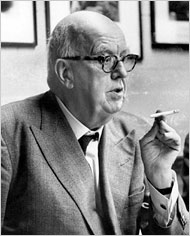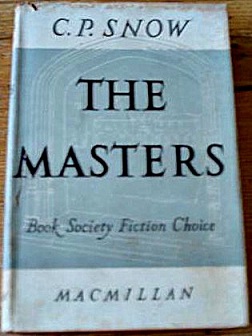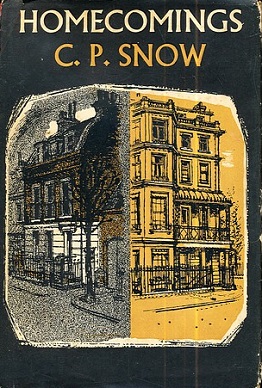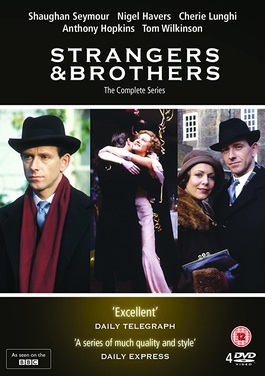
Patricia Highsmith was an American novelist and short story writer widely known for her psychological thrillers, including her series of five novels featuring the character Tom Ripley. She wrote 22 novels and numerous short stories throughout her career spanning nearly five decades, and her work has led to more than two dozen film adaptations. Her writing derived influence from existentialist literature, and questioned notions of identity and popular morality. She was dubbed "the poet of apprehension" by novelist Graham Greene.

Charles Percy Snow, Baron Snow, was an English novelist and physical chemist who also served in several important positions in the British Civil Service and briefly in the UK government. He is best known for his series of novels known collectively as Strangers and Brothers, and for "The Two Cultures", a 1959 lecture in which he laments the gulf between scientists and "literary intellectuals".
Strangers and Brothers is a series of novels by C. P. Snow, published between 1940 and 1970. They deal with – among other things – questions of political and personal integrity, and the mechanics of exercising power.

The Light and the Dark is the fourth novel in C. P. Snow's Strangers and Brothers series. The book portrays narrator Lewis Eliot's friendship with Roy Calvert, and Calvert's inner turmoil and quest for meaning in life. Calvert was based on Snow's friend, Coptic scholar, Charles Allberry. Their relationship is developed further in The Masters.

Corridors of Power is the ninth book in C. P. Snow's Strangers and Brothers series. Its title had become a household phrase referring to the centres of government and power after Snow coined it in his earlier novel, Homecomings.

George Passant is the first published of C. P. Snow's series of novels Strangers and Brothers, but the second according to the internal chronology. It was first published under the name Strangers and Brothers. It was published in the United Kingdom in 1940 and in the U.S. in 1960.

Chitra Banerjee Divakaruni is an Indian-born American author, poet, and the Betty and Gene McDavid Professor of Writing at the University of Houston Creative Writing Program. Her short story collection, Arranged Marriage, won an American Book Award in 1996. Two of her novels, as well as a short story were adapted into films.

Please Don't Eat the Daisies is a best-selling collection of humorous essays by American humorist and playwright Jean Kerr about suburban living and raising four boys. The essays do not have a plot or through-storyline, but the book sold so well it was adapted into a 1960 film starring Doris Day and David Niven. The film was later adapted into a 1965-1967 television series starring Patricia Crowley and Mark Miller. Kerr followed up this book with two later best-selling collections, The Snake Has All the Lines and Penny Candy.

Patrick Ewart Garland was a British director, writer and actor.
The Magician Trilogy is a series of three children's fantasy novels by the British author Jenny Nimmo, first published by Methuen 1986 to 1989. It is sometimes called the Snow Spider trilogy or series after the first book and The Snow Spider Trilogy is the title of its omnibus editions. The stories are inspired by Welsh mythology, with elements borrowed from Mabinogion. Set in contemporary Wales, they feature Gwyn Griffiths, a boy descended from Gwydion who discovers and develops some of the magical power in his lineage.

John Roberts Tunis, "the 'inventor' of the modern sports story", was an American writer and broadcaster. Known for his juvenile sports novels, Tunis also wrote short stories and non-fiction, including a weekly sports column for the New Yorker magazine. As a commentator Tunis was part of the first trans-Atlantic sports cast and the first broadcast of the Wimbledon Tennis Tournament to the United States.

Time of Hope is the first chronological entry in C. P. Snow's series of novels Strangers and Brothers, and the third to be published. It depicts the beginning of Lewis Eliot's life, with a childhood in poverty in a small English town at the beginning of the 20th century.

The Masters is the fifth novel in C. P. Snow's series Strangers and Brothers. It involves the election of a new Master at narrator Lewis Eliot's unnamed Cambridge College, which resembles Christ's College where Snow was a fellow. The 1951 novel's dedication is "In memory of G. H. Hardy", the Cambridge mathematician. It was the first of the Strangers and Brothers series to be published in the United States.

The Conscience of the Rich is the seventh published of C. P. Snow's series of novels Strangers and Brothers, but the third according to the internal chronology. It details the lives of Charles, Katherine and their father, Leonard March, a wealthy Jewish family. Lewis Eliot narrates the story of the conflicting politics of wealth and pre-World War II socialism in England.

Last Things is the eleventh and final installment of C. P. Snow's series of novels Strangers and Brothers.

The Sleep of Reason is the tenth book in C. P. Snow's Strangers and Brothers series.

Homecomings is the seventh book in C. P. Snow's Strangers and Brothers series. The events concern the personal life of narrator Lewis Eliot.

The New Men, published in 1954, is the sixth novel in C. P. Snow's series Strangers and Brothers.
Howard Michael Gould is an American novelist, television writer-producer, screenwriter, director, and playwright.

Strangers and Brothers is a 1984 British television series produced by the BBC. Adapted from the novel series of the same name by C. P. Snow, it ran for a single series of thirteen episodes.
















